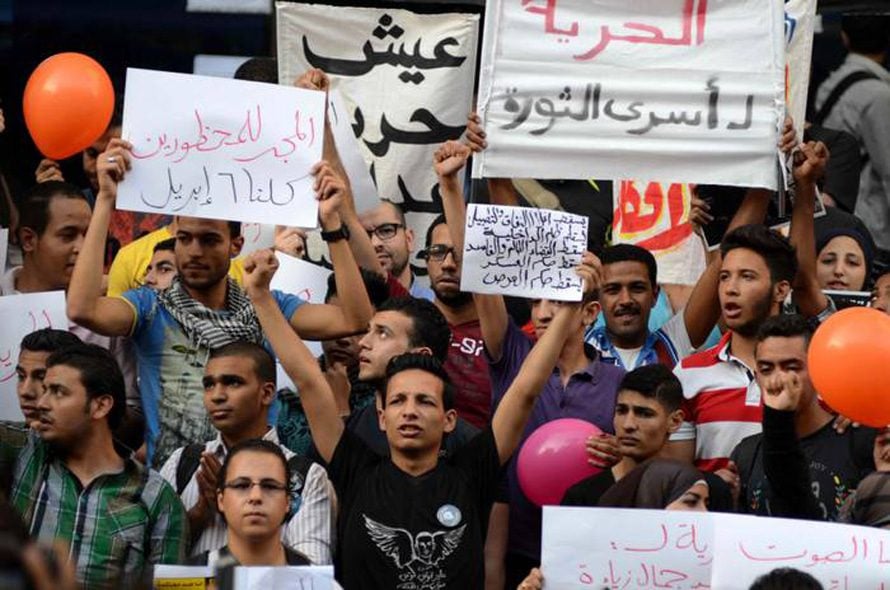
Introduction
Following the popularly backed military coup that ousted Mohamed Morsi, the first freely elected president of Egypt, on 3 July 2013, authorities quickly cracked down on all Islamic TV stations that backed the president, who belonged to the Muslim Brotherhood. The military accused those channels of inciting violence against protesters and the police.
The authorities also raided the offices of Al-Jazeera Mubashir Misr, part of Al-Jazeera news network, which was criticized for its pro-Morsi coverage, took it off the air, and arrested several of its journalists, three of whom were later tried on terrorism charges.
After the televised speech by then defence minister and strongman Abd al-Fattah al-Sisi on 3 July, supporters of the deposed president staged two sit-ins, a large one at Rabaa al-Adawiya Square, in eastern Cairo, and a smaller one at al-Nahda Square, near Cairo University. Thousands of Muslim Brotherhood members and sympathizers took part in the sit-ins for nearly six weeks before security forces finally raided both camps and cleared them in 12 hours.
The death-toll claims vary greatly: the health ministry said that 600 people died and nearly 4,000 were injured, while the Muslim Brotherhood put the number of deaths at 2,600.

While most reports acknowledge that some of the protesters were armed, the vast majority were peaceful. With hundreds of bodies turning up in mosques bearing gunshot wounds and some charred beyond recognition, several human-rights organizations spoke out against the violent dispersal and killing of peaceful protesters, blaming security forces for not following international standards for the dispersal of protests and for failing to minimize bloodshed.
In early March 2014, the National Council for Human Rights (NCHR) released its report on the events, claiming that the first shot was fired by the protesters and that the use of firearms by the police was “justified”. But the report criticized the police for failing to exercise restraint and using disproportionate force.
Anti-protest Law
The dispersal of the Muslim Brotherhood sit-ins set several events in motion. Subsequent protests and marches were met with live fire from security forces, and the interim president eventually passed a new protest law in November 2013 that requires protesters to seek permission from the Interior Ministry before any protests and bans overnight sit-ins. Activists and rights groups opposed the new law, worried that it would curtail the freedom of assembly and prohibit mass demonstrations, similar to the ones that toppled Mubarak and led to the overthrow of Morsi, while giving the police free rein to use force and arrest protesters.
Human Rights Watch published a statement saying that the new law “would effectively give the police carte blanche to ban protest in Egypt. The bill would ban all demonstrations near official buildings, give the police absolute discretion to ban any other protest, and allow officers to forcibly disperse overall peaceful protests if even a single protester throws a stone.”
The organization also stressed that the law “falls far short of Egypt’s obligation to respect freedom of assembly under the International Covenant on Civil and Political Rights.” The government and the interim president have, however, rejected all attempts to overturn the rule.
Banning Political Opponents

Following the dispersal of the Muslim Brotherhood sit-ins, the police cracked down on many of the group’s leaders and members, jailing thousands, including Mohamed Badie, the group’s highest authority, and Mohammed Khairat Saad el-Shater, its second in command.
The widespread crackdown on members of the group forced them to go underground. Many detainees reported bad detention conditions and torture at the hands of the police. A smuggled video from a high-security prison in Egypt, released by The Telegraph, showed tiny dirty cells shared by three prisoners in deplorable conditions.
Sarah Leah Whitson, the Middle East and North Africa director for Human Rights Watch, told Al Arabiya News that, “If these practices are part of a state policy and as systematic as initial reports suggest, they could amount to crimes against humanity.”
Following several terrorism attacks in various Egyptian cities, the Egyptian government moved on 25 December to officially declare the Muslim Brotherhood a terrorist organization. While Islamist militant groups claimed responsibility for the attacks and the Muslim Brotherhood condemned them and insisted it was involved only in peaceful protests, the government blamed the group for the attacks.
This could lead to arrested members of the Islamist group being tried under severe terrorism laws. In March and April 2014, the judiciary in Egypt handed down sweeping death sentences in the cases of more than 1,200 detainees, among them Muslim Brotherhood leader Badie, for acts of terrorism and the killing of police officers, later commuting the sentences of 492 of them to life in prison.
This drew condemnation from most Western countries: in the United States, the White House released a statement that the two rulings “[defy] even the most basic standards of international justice,” urging the Egyptian government to “end the use of mass trials, reverse this and previous mass sentences, and ensure that every citizen is afforded due process.”
The Islamist Muslim Brotherhood was not the only group to face pressure from the government. A court ruling on 28 April 2014 banned the activist group April 6 Youth Movement, one of the groups most involved in the protests that overthrew Mubarak in 2011. The movement’s co-founder, Ahmed Maher, and two other young secular protesters were sentenced to three years in prison for challenging Egypt’s protest law.

